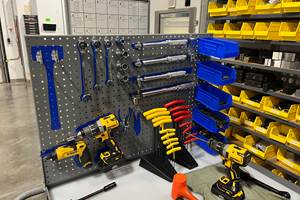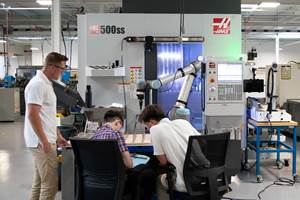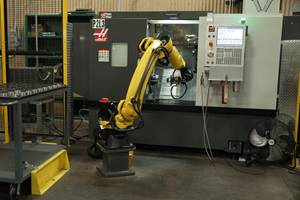Machining, Disruption and the Years Ahead
Three major technological advancements have changed modern manufacturing. Pay attention or get left behind.
Share





The machining industry sits on a precipice—an edge, a turning point, a revolution—one that is coming whether we want it or not. We’ve seen it before, and it has everything to do with technological advancements. They are already here, challenging old-school thinking and disrupting the industry in ways that force us to change our thinking. But there is a divide between those who embrace change and those who dig in their heels. The challenges of the future are not going away—just look at how much the industry has changed in the past 20 years. In order to exist rather than become extinct, we need to look at the greatest disruptions to machining.
3D Printing
3D printing has flooded the machining industry causing some causalities for those who haven’t been able to tread water. It’s hit areas like prototyping and pattern makers with devastating force. Those who didn’t update their equipment and processes are closing their doors, yet this is just the beginning. As the technology becomes more robust in the coming years, it will take over other areas causing more companies to close up shop. Will it take over everything? I don’t think so, not in the next five to 10 years. However, the technology is still evolving. We would do well to monitor 3D printing’s advancements and make sure not to discount it.
Internet of Things (IoT)/Big Data
This is a big advancement, and it’s the fastest moving, most disruptive one. Having already revolutionized the consumer market with voice-activated speakers and IoT home technology, big data is now hitting the industrial sector hard and fast, providing the metalworking industry with methods for increased productivity. Of course, this means the companies that don’t embrace the coming of IoT will be left behind. For metalworking shops, big data enables us to monitor machines and processes, receive data and take action faster than ever before—all of which translates to wiser decisions. Much of this data will be in the cloud and come under the name Industry 4.0 or the Fourth Industrial Revolution.
It’s coming, so it’s important to embrace it now so you don’t get left behind. The past teaches us a lot, and right now, if you want to stay in the game, you have to wise up, get up-to-date and embrace the changes coming.
Robotics
With the lack of skilled labor, companies are turning to robotics and automation. The industry is trending toward replacing manually and cognitively repetitive tasks with some form of automation. This change is inevitable; it’s the nature of progress. Despite this fact, many metal shops shy away from robotics, claiming they don’t have enough volume or that it’s just too complicated. These excuses are anchored in the past, when automation and robotics were complicated and difficult for the layman to understand. Well, things have changed. The advancements have been incredible. What was once complicated is now simple and user-friendly. Thousands and thousands of robots and automation assistants are now being sold every year as they become cheaper and easier to program. So, what’s stopping you?
The integration of robotics and automation is changing both large and small machine shops. As technology becomes easier to use, more machine shops are benefiting from reduced operation costs and increased productivity. I look at robotics as a tool to increase the capacity of our workforce, and as assistive tools to help our employees and companies become globally competitive.
I haven’t covered all the technologies disrupting the industry today or touched on the ones around the corner, but the message is clear: Technology is only going to disrupt the shops and companies that aren’t willing to embrace change. Ignoring robotics today is not an option.
Related Content
Translating a Prototyping Mindset to Production
The experimental mindset that benefited BDE Manufacturing Technologies as a prototype job shop has given it an adaptable edge as a production facility.
Read MoreIncreasing Productivity with Digitalization and AI
Job shops are implementing automation and digitalization into workflows to eliminate set up time and increase repeatability in production.
Read MoreCNC Machine Shop Honored for Automation, Machine Monitoring
From cobots to machine monitoring, this Top Shop honoree shows that machining technology is about more than the machine tool.
Read MoreWhich Approach to Automation Fits Your CNC Machine Tool?
Choosing the right automation to pair with a CNC machine tool cell means weighing various factors, as this fabrication business has learned well.
Read MoreRead Next
Machine Shop MBA
Making Chips and 91ÊÓƵÍøÕ¾ÎÛ are teaming up for a new podcast series called Machine Shop MBA—designed to help manufacturers measure their success against the industry’s best. Through the lens of the Top Shops benchmarking program, the series explores the KPIs that set high-performing shops apart, from machine utilization and first-pass yield to employee engagement and revenue per employee.
Read MoreLast Chance! 2025 Top Shops Benchmarking Survey Still Open Through April 30
Don’t miss out! 91ÊÓƵÍøÕ¾ÎÛ's Top Shops Benchmarking Survey is still open — but not for long. This is your last chance to a receive free, customized benchmarking report that includes actionable feedback across several shopfloor and business metrics.
Read MoreAMRs Are Moving Into Manufacturing: 4 Considerations for Implementation
AMRs can provide a flexible, easy-to-use automation platform so long as manufacturers choose a suitable task and prepare their facilities.
Read More






















